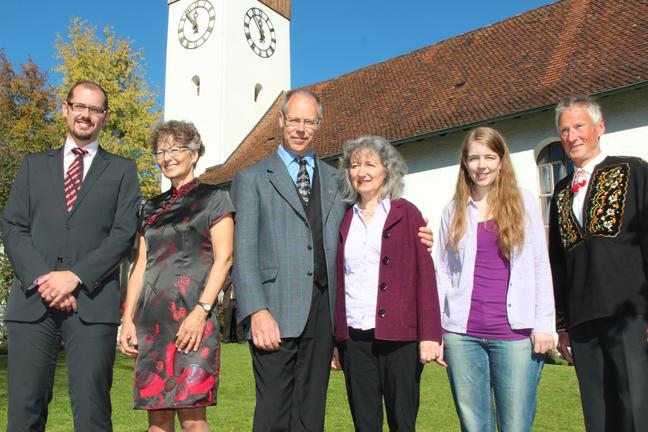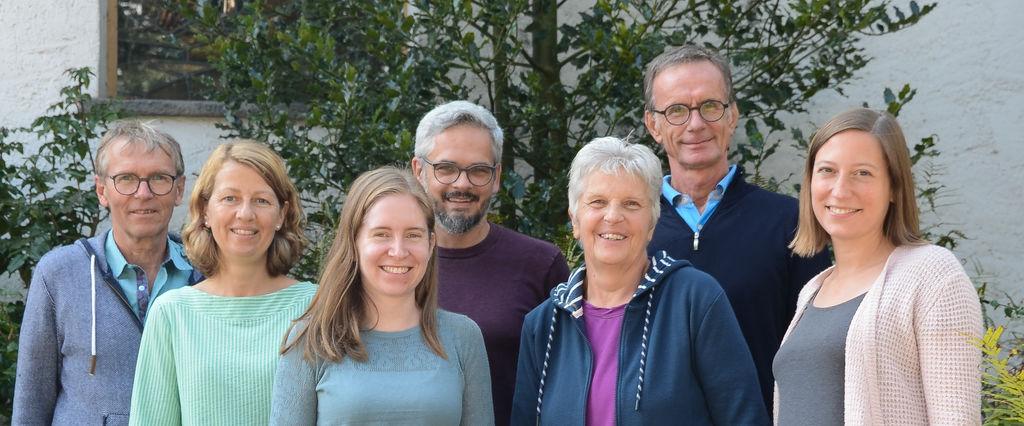
In this series, we ask pastors from particularly vibrant parishes questions about the secret of their "success". Today Paul Veraguth from Wattenwil, who shaped the community until he left in October 2014.
From left: Rev. Samuel Hug, Rev. Regula Scharnowski, Rev. Paul Veraguth, Yvonne Veraguth, Rev. Sarah Linder and parish council president Kurt Güngerich in front of the church in Wattenwil when he left in October 2014Livenet: Paul Veraguth, why is there a in your parish so intense community life?Paul Veraguth: Community life could also be more intense. But I would say: there is diversity in the areas of worship, prayer, senior citizens and children's work, there are good approaches for further developments in the supra-congregational area, in adult education and employee development. And there are painful weak points, for example in home groups, in diakonia and in efficient evangelism. The reasons for the positive developments are complex. A solid prayer base with three morning prayers per week plays a role as well as gift-oriented leadership and participation (we are three part-time pastors), a blessing attitude towards God's people Israel and a consistently professing church leadership. One never knows the ultimate reasons for grace, other than that it is grace.What makes your congregation different from more traditional church congregations?
Paul Veraguth (centre) with colleague Samuel Hug (left) and colleague Regula Scharnowski We are still traditional to a large extent. However, if we look at the structure of the service, the "young-fresh-cheeky seven-to-seven service" is more of an away game for traditionalists. The fact that people can pay part of the tithe into the church treasury and thus enable part-time work and services outside the financial radius of the church community is what some call a “free church structure”. People with fence mentality also find the monthly service with seven churches and free churches in the valley, which promotes the body of Christ in the region, unnecessary. Another atypical feature is our non-bureaucratic work culture, which leads to flexibility and spontaneity.What is the philosophy behind your parish «Pray and work». That was already the case with Paul. "Gifts are responsibilities," a liberating principle that also has an obligatory side, or as we prefer to say, much encouragement. "Speak, Lord, your servant is already running" - no, of course not, but "Listen, then (if necessary) run or act." «Without the tuning of the Holy Spirit there is cacophony, with him there is racy Dixieland». And further: "Clarity in essence, otherwise freedom and diversity": The view of the kingdom of God does not have to see everything growing in one's own garden. All of our employees also work on non-communal fields. Finally: "Relationship instead of education", an area where we are still in the infancy. Paul said yes: "You have few fathers, but all the more know-it-alls and moralists", somewhat loosely translated.
How does your church community motivate people to get involved and take responsibility? No one feels pressured into ministry or into a participatory ideology. Some vessels arose from concerns of individuals who were then supported by the leaders. Creating such platforms is a core element of our way of working. People feel that they can make mistakes and try something out. And at the same time we have not supported initiatives from the New Age corner so far; this spirit discernment is also a growth principle. It can be compared to the picture of the vine, the barren shoots and the nurturing of the fruitful branches, John 15. The need for harmony, fear of man and the inability to deal with conflict often prevent necessary limitations.


Describe the service concept in your congregation. We orientate ourselves a little on Radio SRF: There is, for example, the classic station SRF 2, which is tuned in by around 15%. Few people see it as a home game when the organ roars. It therefore occurs rather seldom. We have worship services, Ländler services and those with a gospel-like outfit, everything more in the mainstream of SRF 1 or 3, as well as a quiet Taizé group, in addition to the youth service already mentioned with a relatively high decibel. So much for the cultural setting. The internal structure ranges from a traditional sermon style to forms of broader participation by employees and loose freedom that ends in the workshop type. Regular "Church-in-Action" services, usually on the fifth Sunday of the month, open windows and doors to missions and to regions of the two-thirds world.
How do supporters of traditional offerings and services find a place in your church community? Because the various forms of service are held on a monthly basis, the members of the congregation know which service they are not overwhelmed or bored with. So there are shift changes to some extent, but there is also a flexible core of church members who don't mind the different stable smells. Anyone who wants to attend a time-honoured service can do so, but not without first studying the register. Other traditional offerings include the Bible Discussion Group and Senior Citizens Groups.
Are you sometimes questioned by supporters of a traditional church community or by the general public? How do you react to that? For thirty years we have been grinding a slow mill. All of the heaps of change led to the kind of conflicts your question implies. There were people who demonstratively left the service. Or slam a door. If that happens or if the press gets upset like it was a dozen years ago, then it automatically slows things down. The leaven, as Jesus says, is kneaded into the whole dough. Kneading is nobody's hobby. But staying tuned is what counts, lots of conversations, some of which always lead to better mutual understanding. But not all.
Could you briefly describe a personal highlight in your parish? And explain why it was a highlight. The hourglass on the pulpit was stolen by a teenage drug addict who gave it to his girlfriend as a birthday present. Many years later, after his repentance, he came back one day with the watch, apologized and gave it back to us. Of course, we rejoiced even more in the sheep that the Good Shepherd had recovered than in the clock that had returned, just a reminder that time is nothing but the passing sand. God's grace is different.







